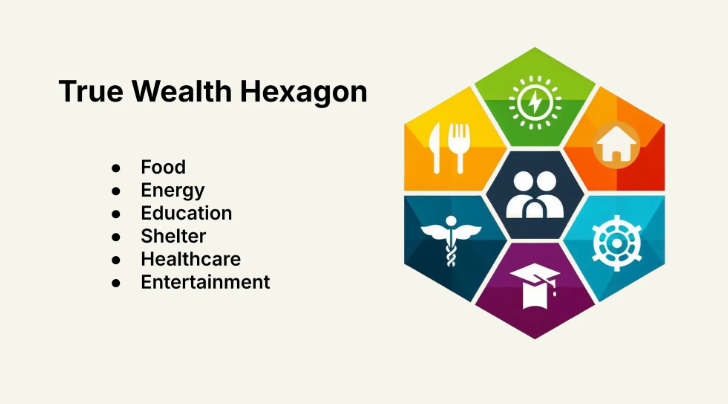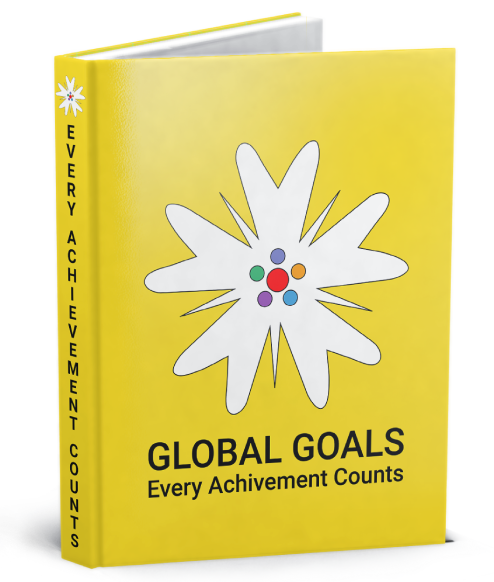There has never been a problem with the resources, the problems lie within distribution.
Discover how data-driven strategies can power equitable resource redistribution aligned with sustainable goals, ensuring fair access to food, energy, shelter, healthcare, education, and entertainment worldwide.
Introduction
In a world where resources are abundant but often unevenly distributed, achieving fairness is both a moral and strategic priority. Resource redistribution, when guided by accurate data and aligned with sustainable goals, can bridge the gap between abundance and scarcity. From food and energy to healthcare and education, the way we allocate resources shapes social, economic, and environmental stability.
In this article, we’ll explore how data-driven decision-making combined with the Global Goals principles can transform resource allocation across six essential dimensions of life: Shelter, Healthcare, Education, Food, Energy, and Entertainment—also known as the True Wealth Hexagon.

Why Resource Redistribution Matters in the Sustainable Goals Era
The United Nations’ Sustainable Development Goals (SDGs) outline a universal framework for ending poverty, protecting the planet, and ensuring prosperity for all. Yet, the global imbalance in access to essential resources remains a challenge.
Resource redistribution is not just about charity—it’s about creating systemic fairness. By integrating AI, blockchain, connectivity, and ethical data usage (the ABCDE framework), we can ensure resources flow where they are most needed, in real time.

The Power of Data in Resource Allocation
Data is the backbone of effective resource management. When governments, NGOs, and private sectors work with open, transparent, and verifiable data, they can:
- Identify resource gaps before crises escalate.
- Predict demand based on population growth, climate impact, or economic shifts.
- Prevent misuse or inequitable hoarding of supplies.
For example, in agriculture, AI-powered analytics can detect food surplus in one region and trigger blockchain-based distribution networks to deliver it to food-scarce areas, reducing waste and hunger simultaneously.
1. Food Security: Using Technology to Reduce Waste and Hunger
Food waste is a paradox in the face of global hunger. By applying AI forecasting, we can match production with consumption patterns, reducing oversupply in one area and redirecting it to regions in need.
A blockchain-enabled supply chain ensures every food shipment is tracked, reducing corruption and ensuring fair distribution in line with SDG 2: Zero Hunger.
2. Clean Energy: Democratizing Power Access
Energy is vital for development, but access remains unequal. Clean, renewable energy systems—like solar and wind—can be redistributed through smart grids powered by real-time connectivity.
By leveraging ethical AI and open data, communities can prioritize energy delivery during crises, ensuring hospitals, schools, and vulnerable households remain powered. This aligns directly with SDG 7: Affordable and Clean Energy.
3. Shelter and Infrastructure: Building Sustainable Homes Where They’re Needed Most
Urban development often leaves rural or marginalized areas behind. With geospatial data mapping, planners can identify shelter needs and deploy modular, eco-friendly housing efficiently.
This approach not only meets SDG 11: Sustainable Cities and Communities but also ensures that shelter investments are climate-resilient and community-driven.
4. Healthcare Access: Data for Life-Saving Equity
From vaccines to hospital beds, healthcare resources are often concentrated in wealthier regions. By using blockchain to track medical supplies and AI to predict health crises, decision-makers can redistribute resources proactively.
Mobile health units connected through low-latency networks can extend healthcare access to remote areas, advancing SDG 3: Good Health and Well-Being.
5. Education: Bridging the Knowledge Gap with Connectivity
Education is the foundation for sustainable growth, yet digital divides persist. Smart education platforms powered by AI can recommend personalized learning content, while blockchain credentials can verify student achievements globally.
By investing in connectivity infrastructure, we ensure that students in rural areas have equal access to digital learning resources—driving SDG 4: Quality Education.
6. Entertainment & Recreation: Enhancing Cultural and Social Well-being
While often overlooked in sustainability discussions, entertainment and recreation are critical for mental health and cultural preservation. Through connected digital platforms, creators can distribute content globally, ensuring cultural exchange and diversity thrive.
This aligns with the True Wealth Hexagon’s vision of holistic well-being beyond just survival needs.
Ethics: The Foundation of Sustainable Resource Redistribution
Without ethical oversight, even the most advanced systems can perpetuate inequality. Clear data governance frameworks, inclusive decision-making, and transparency are essential.
The ABCDE framework—AI, Blockchain, Connectivity, Data, Ethics—ensures that technology serves humanity rather than exploiting it.
Conclusion: Turning Data into Global Equity
Fair resource redistribution is achievable when we combine data intelligence with the Global Goals principles. By applying cutting-edge technologies within an ethical framework, we can ensure Food, Energy, Shelter, Healthcare, Education, and Entertainment are accessible to all.
The vision is clear: every achievement counts, and every decision matters in building a fairer, more sustainable future.
Want to explore practical ways individuals, organizations, and policymakers can contribute to this vision? Dive deeper into the ideas and case studies in Global Goals: Every Achievement Counts—your guide to aligning purpose with action.
